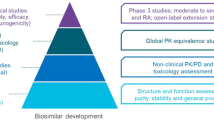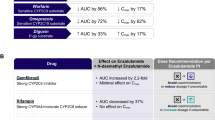Abstract
Background
Selonsertib is a first-in-class inhibitor of apoptosis signal-regulating kinase 1 (ASK1) with therapeutic potential for fibrotic diseases. This phase I study evaluated the safety, tolerability, pharmacokinetics (PK), and food effect of selonsertib in healthy subjects.
Methods
This was a double-blinded, randomized, placebo-controlled dose-escalation study. Healthy subjects received 1, 3, 10, 30, or 100 mg of selonsertib or placebo as single or multiple doses once daily for 14 days in the fasted state, or 30 mg or placebo single dose in the fed state. Blood and urine (single-dose cohorts only) samples for selonsertib PK were collected and safety was assessed throughout the study. Ex vivo pharmacodynamic (PD) assessment was performed in blood from a separate cohort of healthy donors using an auranofin-stimulated C-X-C motif chemokine ligand 1 (CXCL1) assay.
Results
Overall, 107 subjects (83 active, 24 placebo) were enrolled and randomized to 11 cohorts. Selonsertib was generally well tolerated; adverse events were generally mild to moderate. Selonsertib was rapidly absorbed with dose-proportional PK of both parent and inactive metabolite GS-607509. There was no food effect on selonsertib PK. Renal excretion was a minor pathway of selonsertib elimination. Selonsertib half maximal effective concentration (EC50) in human whole blood was determined to be 56 ng/mL.
Conclusions
Selonsertib exhibited a favorable PK profile amenable to once-daily dosing without regard to food. PD data suggest pharmacologically relevant exposures were achieved in the dose range evaluated. Study results support further clinical development of selonsertib.



Similar content being viewed by others
References
Soga M, Matsuzawa A, Ichijo H. Oxidative stress-induced diseases via the ASK1 signaling pathway. Int J Cell Biol. 2012;2012:439587.
Ryong Cha D. Where do we stand on human diabetic nephropathy? Kidney Res Clin Pract. 2013;3:93–5.
Adhikary K, Chow F, Nikolic-Paterson DJ, Stambe C, Dowling J, Atkins RC, et al. Abnormal p38 mitogen-activated protein kinase signalling in human and experimental diabetic nephropathy. Diabetologia. 2004;7:1210–22.
Tesch GH, Ma FY, Nikolic-Pateson DJ. ASK1: a new therapeutic target for kidney disease. Am J Physiol Renal Physiol. 2016;2:F373–81.
Lim AK, Nikolic-Paterson DJ, Ma FY, Ozols E, Thomas MC, Flavell RA, et al. Role of MKK3-p38 MAPK signalling in the development of type 2 diabetes and renal injury in obese db/db mice. Diabetologia. 2009;2:347–58.
Prakash J, Sandovici M, Saluja V, Lacombe M, Schaapveld RQ, de Borst MH, et al. Intracellular delivery of the p38 mitogen-activated protein kinase inhibitor SB202190 [4-(4-fluorophenyl)-2-(4-hydroxyphenyl)-5-(4-pyridyl)1H-imidazole] in renal tubular cells: a novel strategy to treat renal fibrosis. J Pharmacol Exp Ther. 2006;1:8–19.
Ma FY, Liu J, Nikolic-Paterson DJ. The role of stress-activated protein kinase signaling in renal pathophysiology. Braz J Med Biol Res. 2009;1:29–37.
Tesch GH, Ma FY, Han Y, Liles JT, Breckenridge DG, Nikolic-Paterson DJ. ASK1 inhibitor halts progression of diabetic nephropathy in Nos3-deficient mice. Diabetes. 2015;11:3903–13.
Liles JT, Corkey BK, Notte GT, Budas G, Lansdon EB, Hinojosa-Kirschenbaum F, et al. ASK1 contributes to fibrosis and dysfunction in models of kidney disease. J Clin Invest. 2018;128:4485–500.
Karnik S, Charlton M, Popov Y, Goodman ZD, Nash M, Sulfab M, et al. Pharmacologic inhibition of apoptosis signal-regulating kinase 1 (ASK1) in a murine model of NASH with pre-existing disease blocks fibrosis, steatosis, and insulin resistance [abstract]. Hepatology. 2014;60(Suppl):570A.
Huntzicker EG, Goodman ZD, Loomba R, Charlton MR, Newstrom D, Yen EH, et al. Hepatic expression of the apoptosis signal-regulating kinase 1 (ASK1) marker, phosphorylated-P38 (p-P38), correlates with fibrosis stage in patients with NAFLD [abstract]. Hepatology. 2015;62(Suppl):1254A.
Karnik S, Charlton M, Li L, Nash M, Sulfab M, Newstrom D, et al. Efficacy of an ASK1 inhibitor to reduce fibrosis and steatosis in a murine model of NASH is associated with normalization of lipids, hepatic gene expression, and a reduction in serum biomarkers of inflammation and fibrosis [abstract]. Hepatology. 2015;62(Suppl):877A.
Nelson CH, Wang L, Fang L, Weng W, Cheng F, Hepner M, et al. A Quantitative framework to evaluate proarrhythmic risk in a first-in-human study to support waiver of a thorough QT study. Clin Pharmacol Ther. 2015;98:630–8.
Kirby BJ, Nelson CH, Billin A, Chen F, Patel UD, Mathias A. Pharmacokinetic-pharmacodynamic relationships for the effect of selonsertib on eGFR in a Phase 2 study in subjects with diabetic kidney disease [abstract]. J Am Soc Nephrol. 2018;29(Suppl):775.
Chertow GM, Pergola PE, Chen F, Kirby BJ, Sundy J, Patel UD, et al. Effects of selonsertib in patients with diabetic kidney disease (DKD). J Am Soc Nephrol. 2019;30:1980–90.
Loomba R, Lawitz E, Mantry PS, Jayakumar S, Caldwell SH, Arnold H, et al. The ASK1 inhibitor selonsertib in patients with nonalcoholic steatohepatitis: a randomized, phase 2 trial. Hepatology. 2018;67:549–59.
Acknowledgements
This study was supported by Gilead Sciences. The authors thank the study participants and their families, as well as the investigators and site personnel. Medical writing support was provided by Sunila Reddy, PharmD.
Author information
Authors and Affiliations
Corresponding author
Ethics declarations
Funding
This study was sponsored by Gilead Sciences, Inc.
Conflicts of interest
Cara Nelson, Kim Etchevers, Saili Yi, David Breckenridge, Mischa Hepner, Uptal Patel, John Ling, and Anita Mathias are employees and shareholders of Gilead Sciences, Inc.
Ethical approval
All procedures performed in studies involving human participants were in accordance with the ethical standards of the institutional and/or national research committee (Schulman Associates IRB, IRB# 201303831) and with the 1964 Helsinki declaration and its later amendments or comparable ethical standards. Informed consent was obtained from all individual participants included in the study.
Informed consent
Informed consent was obtained from all individual participants included in the study.
Rights and permissions
About this article
Cite this article
Nelson, C.H., Etchevers, K., Yi, S. et al. Pharmacokinetics, Safety, and Tolerability of Selonsertib, an Apoptosis Signal-Regulating Kinase 1 (ASK1) Inhibitor, Following First-in-Human Single and Multiple Ascending Doses in Healthy Subjects. Clin Pharmacokinet 59, 1109–1117 (2020). https://doi.org/10.1007/s40262-020-00878-y
Published:
Issue Date:
DOI: https://doi.org/10.1007/s40262-020-00878-y




